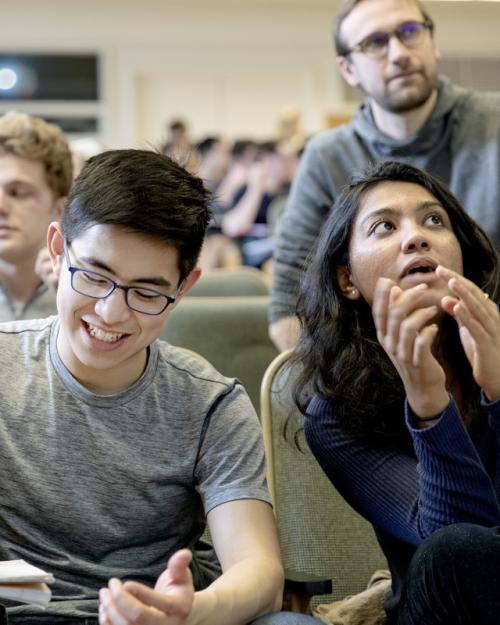In 2022, the Active Learning Initiative (ALI) invited applications for the new Active Learning Postdoctoral Fellowship program from all departments within Cornell. The three-year grants support a teaching postdoc to work with a team of faculty members in departments who want to introduce active learning into their courses. Departments can apply for the new grants when the application cycle opens each fall.
Beginning in 2023, teaching postdocs will support the Departments of City & Regional Planning in the College of Architecture Art Planning (AAP) and Molecular Biology and Genetics in the College of Agriculture & Life Sciences (CALS) and the College of Arts & Sciences (A&S); and the School of Integrative Plant Science (CALS).
“These grants provide a unique opportunity for faculty who are new to active learning and want to learn more or for those who want to expand upon initial efforts in implementing these teaching strategies,” said ALI Director Peter Lepage, the James S. Tisch Distinguished University Professor Emeritus (A&S).
The new ALI Postdoctoral Fellows have a Ph.D. in their respective disciplines and a strong interest in teaching. Throughout their appointment, they will work closely with department faculty on course transformations to facilitate improvements in student learning by helping faculty research, develop, and implement new teaching materials and approaches.
With a goal of giving students more agency over their learning, active learning strategies stress giving students time to process and discuss what they are learning and to practice and apply their knowledge to develop expertise and facility with the subject.
The strategies likewise emphasize designing innovative projects and assignments, including student-directed lab experiments, video assignments, and semester-long projects.
Since its founding in 2012 with the support of Alex and Laura Hanson ‘87, ALI has expanded its reach significantly on campus, supporting successful course transformations in 19 departments, including humanities, social sciences and STEM courses. From 2012-2022, ALI postdocs supported more than 100 faculty at Cornell as they incorporated active learning strategies into their courses.
The Active Learning Postdoctoral Fellowship is funded by College Deans of participating departments, the Provost's office, and by Alex and Laura Hanson '87. It is supported by Cornell's Office of the Vice Provost for Academic Innovation and the Center for Teaching Innovation.
Recipients of the 2023-2026 ALI Postdoctoral Fellowships:
Department of City and Regional Planning (AAP)
The Department of City and Regional Planning (CRP) recently redesigned its undergraduate curriculum to better prepare students for working with cities around the world as they confront accumulating crises stemming from shifting economies and legacies of inequality. This new curriculum helps students prioritize questions of justice and equity to frame the challenges urban residents face, and to engage in finding sustainable solutions with communities, officials, and policy makers.
With the new curriculum in place, CRP is poised to design three new undergraduate courses that will incorporate active and engaged learning, giving students the opportunity to practice the methods of the discipline, such as participatory planning and research, interviewing, collaborative data collection, map making, and qualitative and quantitative data analysis.
School of Integrative Plant Science (CALS)
Since its inception in 2015, the School of Integrative Plant Science (SIPS) has made the creation of a strong and progressive teaching ecosystem a top priority and has worked to transform its core undergraduate curriculum. In 2019, SIPS received an ALI grant to redesign ten undergraduate courses and labs, incorporating active learning and experimentation while further streamlining its curriculum.
Now, with its 2023 funding, SIPS plans to build on its earlier work with the transformation of four additional courses and the development of one new course. Courses will incorporate active learning strategies, such as case studies, group projects, discussions, and two-part group exams.
Implementing active learning and inclusive teaching strategies across their undergraduate curriculum will support SIPS’s commitment to increase the diversity of students in their undergraduate program and build community at both the undergraduate and graduate levels.
Molecular Biology & Genetics (CALS & A&S)
The Department of Molecular Biology & Genetics has developed a plan to design and implement new active learning strategies, such as early and late-semester assessment, polling, pre-lecture work, quizzes, and collaborative group work in five large, core biology courses of 170-400 students.
Through these strategies the participating faculty will strive to encourage community-building and cooperative learning, increase student confidence, better connect students with existing support, and help shift classroom culture from competitive to collaborative.
Teaching assistants will play an integral role in this process, and the department plans to create training modules on active learning strategies, pedagogy, and course-specific materials, to better prepare TAs for working with students in the transformed courses. The transformed courses will better support an increasingly diverse pool of students coming from all backgrounds and walks of life to achieve their career goals.




